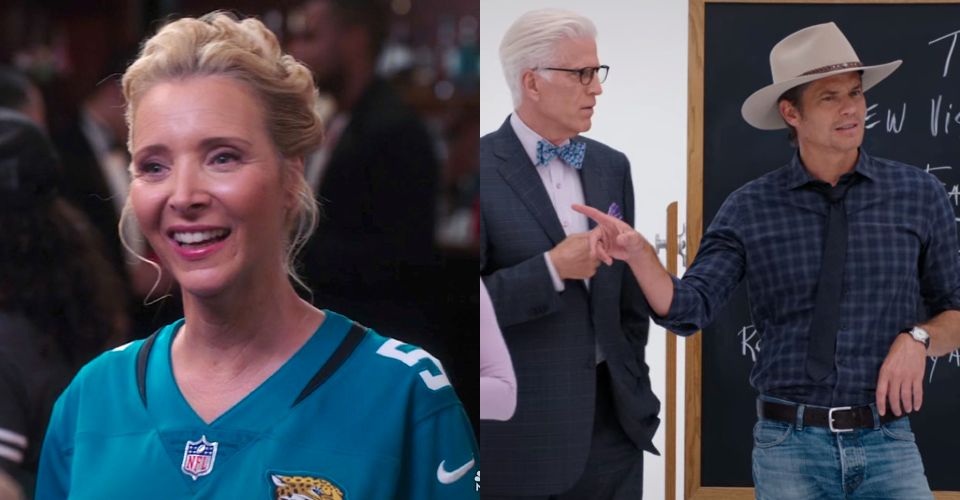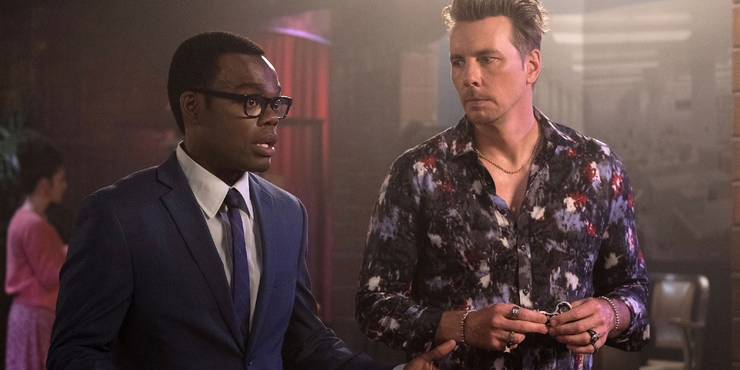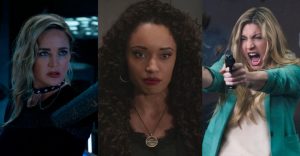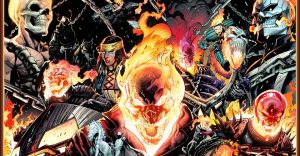The Good Place: 10 Best Characters To Only Appear In One Episode

There are a lot of things to love about The Good Place: the blend of intelligent discourse and silly humor, the intricate relationships built over four seasons of storytelling, the playful world-building. But one of the show’s greatest strengths was its use of interesting characters. Most of these characters, especially the core cast, were explored over multiple seasons, allowing nuance to be explored and growth to be discovered. In fact, growth was always center to the heart of the show.
But sometimes, a character made an immediate impact, showing up to impart either a lesson or experience to Eleanor, Chidi, Tahani, or Jason. These momentary glimpses of the larger world, both on this side of the living and beyond, give a greater sense of context and depth to the world. These characters don’t last long in terms of screen time, but they make an important impression. And sometimes these one-off appearances could underline the emotional and philosophical emphatically and beautifully.
10 Chet-“Rhonda, Diana, Jake and Trent”

Chet is one of the demons that Chidi and Jason encounter in the underworld, working the newly founded department of toxic masculinity. Chet is the typical Bad Place demon: gleeful in his occupation, unapologetic in the effectiveness of his work. There are plenty of other fun demons throughout the run of The Good Place, but Chet’s familiar and sociable demeanor are unique. He isn’t selfish or self-centered; he just happens to torture bad people for eternity. Even more surprising because Chet is played by Dax Shepard, Kristen Bell’s real-life husband.
9 Neil-“Janet(s)”

Neil is introduced as the head of the accounting department for the afterlife, responsible for calculating where people deserve to go after they die. Played with precise obsessiveness by Stephen Merchant, Neil is typical of the upper management immortals on The Good Place: he believes in the system, with little remorse or sense of subjectivity. It’s all just dispassionate numbers, checked thousands of times. In his brief time, Neil personifies the inherent flaw in a dispassionate, bean-counting process for redemption, and the need for more interpersonal relational growth, a key theme of the show.
8 Gwendolyn-“The Book of Dougs”

The gang meets Gwendolyn in the Good Place Correspondence Center, an immortal mail carrier who is endless effusive and personable. She also comes across as slightly gullible, but that is primarily motivated by her desire to be agreeable. What makes Gwendolyn pop into such a memorable character is Nailed It’s always entertaining host Nicole Byer, whose natural bubbliness and likeability always elevates whatever she shows up in. Her rapport and back and forth with the core crew makes even the most passing comment hilarious. It is honestly surprising that Gwendolyn didn’t return for the final season; she is among the most immediately charming Good Place personalities.
7 Doug Forcett-“Don’t Let the Good Life Pass You By”

Doug Forcett hangs over the entirety of The Good Place, so when he finally enters in person, it cements a significant moment in the show’s philosophical journey. What makes Doug so immediately significant is how actor Michael McKean embodies the anxiety that comes with knowing the path towards eternity and being unable to get it out of his head.
The intermingling of the peace of knowing and the fear of not acting correctly is clear in Doug’s every action. Actually meeting Doug is one of the great promises the show fulfills, and his one-off appearance is a hinge for the show’s biggest philosophical pivot.
6 Dave Katterune- “A Fractured Inheritance”

There are a lot of emotional layers to Eleanor meeting her mother’s new family, but among the most complex is her husband Dave. Dave is a lovable goof, self-effacing but also extremely aware of his own limitations. Initially, Eleanor is convinced Dave is being taken advantage of, but it becomes clear that he lives in a state of earnestness with her mother that she was never afforded. Dave’s decency is played wonderfully by Andy Daly, typically known for his more subtle but pitch dark sense of humor. But Daly’s performance of Dave centers on his unambiguous genuine decency. The Good Place always featured likable characters, and Dave stands out as someone who is honest and comfortable in his own skin. When Donna and Eleanor meet again, Dave is not around, which is a shame because he adds such a warm grounding to Donna.
5 Hortense-“The Brainy Bunch”

The hostess of the Cowboy Skycraper Buffet, Hortense makes a very short but impactful impression. Her role is to immediately communicate the tone of the restaurant, a broad stereotype of American identity. The fact actress Antoinette Iesue seamlessly shifts between an American and Australian accent sells the whole conceit. Iesue perfectly captures the sort of practiced upbeat attitude food service requires, playing the ridiculous concept straight enough to sell it earnestly. By far the shortest performance here, but a memorable one.
4 Chef Patricia-“Jason Mendoza”

Chef Patricia is the head chef of Good Plates, the restaurant in Michael’s fake Good Place where the only thing on the menu is the diner’s favorite meal. While Chef Patricia is an entirely silent performance, her scowling demeanor in contrast to the joyful atmosphere makes for a memorable moment in the early episodes of the show, and is even more interesting on a second watch once the viewer realizes the truth of the circumstances.
Patricia as an idea, a stern but well-meaning chef who slaves over unique meals as part of her eternal reward, makes infinitely more sense as a personalized conception of hell. The fact Patricia’s scowling presence never shows up again throughout the rest of the first season is both surprising and disappointing
3 Lod Raver-“Jeremy Beariamy”

This classic episode has lots of one-off characters that stand out. In the end, Lod Raver, the hilariously named bartender (almost everyone in this episode has spoonerisms for names) who starts Eleanor on her quest, gets the nod both because he fulfills the role of kicking off a trademark Good Place philosophical argument, but also because he exudes an easy warmth and decency that launches Eleanor on her quest. He isn’t a character that demands to be returned to, but that is precisely the point, that small acts of kindness for people we will never see again can have significant ripple effects.
2 Timothy Olyphant-“You’ve Changed Man”

When Janet conjures her own version of Timothy Olyphant in “You’ve Changed, Man” to appease the Judge, the real Olyphant plays to his perceived public persona perfectly. Folksy, curious, and of course ceaselessly gentlemanly, Olyphant clearly is having a blast of inserting his inherent integrity into such an outsized setting, especially in contrast to the grounded and tense shows Olyphant typically appears in like Justified. It is the sort of injection of the familiar in the absurd and profound that marks the show’s greatest moments. Olyphant could be a forgettable and half-hearted celebrity cameo as a joke; instead, he functions as a means of communicating the sincerity of the moment.
1 Hypatia-“Patty”

The problem with eternity is personified in Lisa Kudrow’s performance of real philosopher Hypatia of Alexandria. Through her difficulty of expressing basic concepts such as math, or endlessly consuming distracting milkshakes, Kudrow’s Hypatia is able to shift between relaxation, panic, and analytical conversation. Kudrow is a professional and can nail a one-off performance like this, but what highlights Hypatia as one of her best is just how well she communicates the late series reveals of the actual issues with the Good Place as a concept and is still entertaining and effortlessly funny.

















